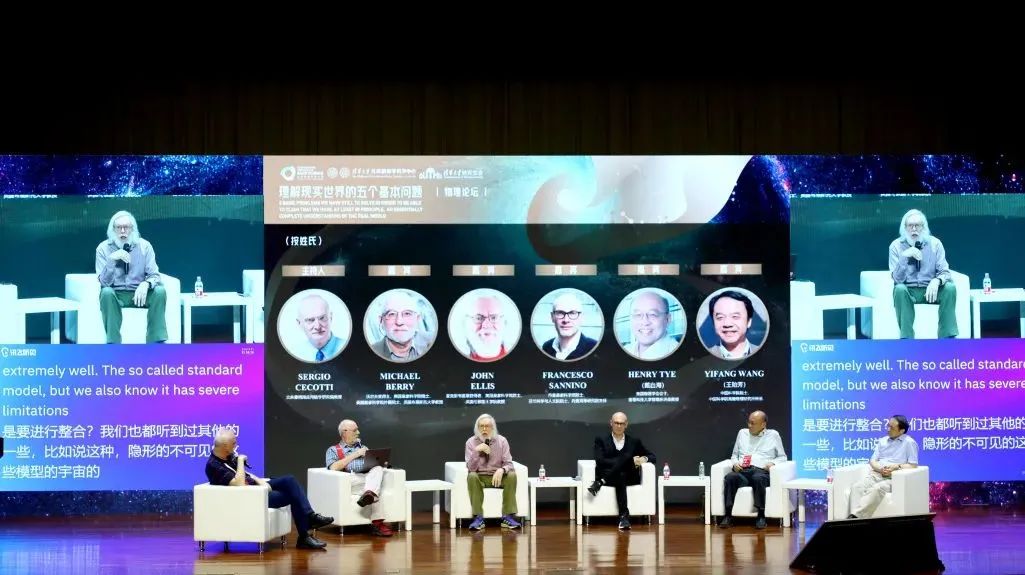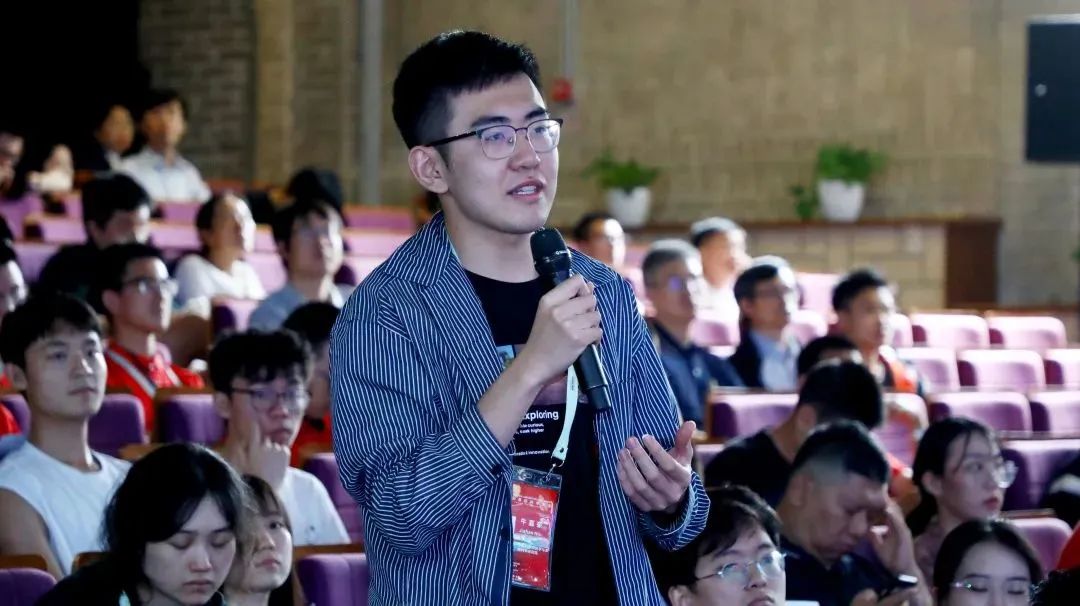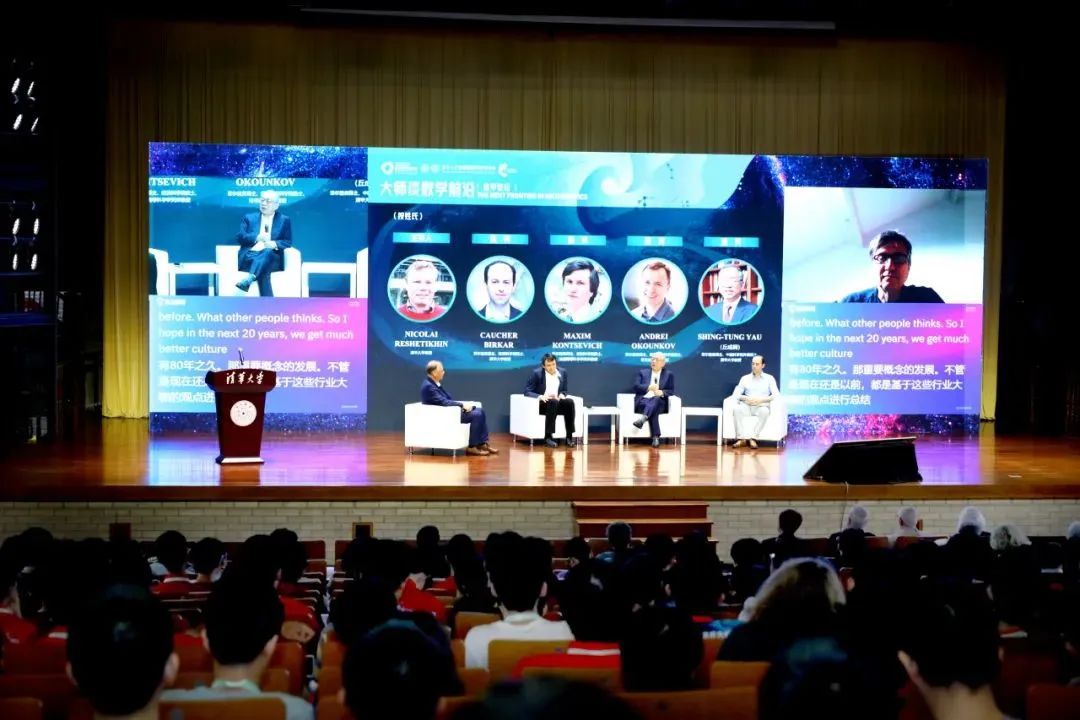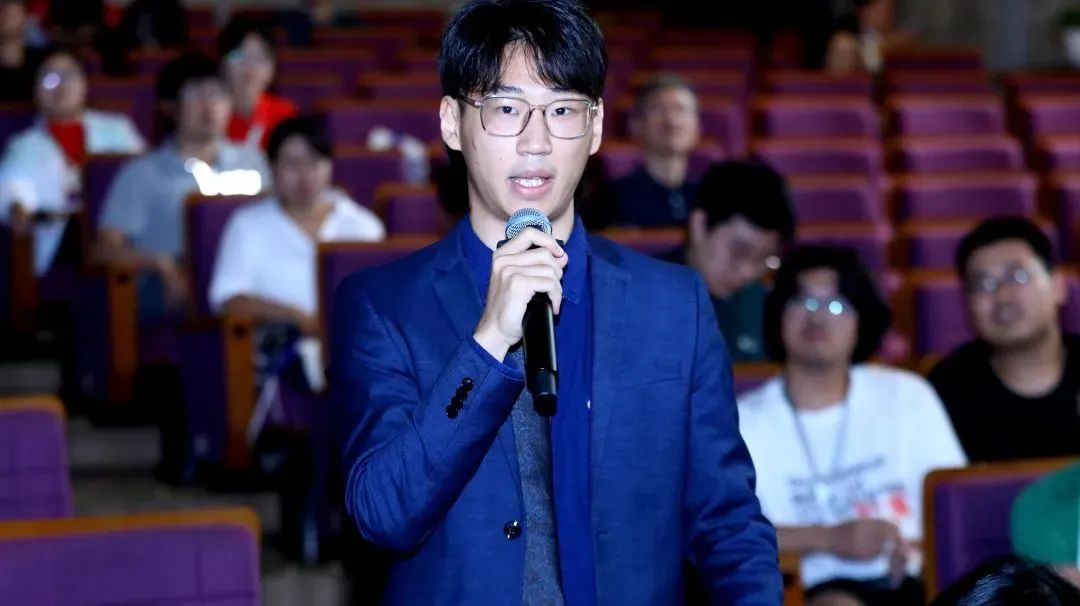In ICBS, a face-to-face academic exchange between science masters and young students was held in the auditorium of Tsinghua University. From "the most important mathematical problem in the next twenty years" to "the five basic problems of understanding the real world", from mathematical thinking to the frontier of physics, the century-old hall has once again witnessed the battle of wisdom, reflecting the vigor and vitality of young youth.
Series Summit Forum of The International Conference of Basic Science invited 11 top international scholars in related fields, Mathematics includes four Fields Prize winners Shing-Tung Yau, Maxim Kontsevich, Andrei Okounkov, Caucher Birkar, Weyl-Wigner Award winner Nicolai Reshetikhin; the Physics fields include Michael Berry, a Wolf Prize winner, Sergio Cecotti, a researcher at the Beijing Yanqi Lake Institute of Applied Mathematics, John Ellis, an academician of the Royal Academy of Sciences, Francesco Sannino, director of the Danish Institute for Advanced Studies, Dai Zihai, a fellow of the American Physical Society, and Wang Yifang, an academician of the Chinese Academy of Sciences.
This activity is sponsored by the Shing-Tung Yau Mathematical Science Center of Tsinghua University and co-organized by the Graduate Student Association of Tsinghua University.

Picture: Mathematics Forum.
In the Mathematics Forum.
Nicolai Reshetikhin presided over the theme mathematics forum of "The Master Talks on the Frontier of Mathematics". Shing-Tung Yau, Maxim Kontsevich, Andrei Okounkov, and Caucher Birkar have published their insights on a series of frontier problems in the development of mathematical subjects.
On the most important challenge in mathematics in the next 20 years.
Yau believes that it is to look for the basic geometric model of unifying quantum mechanics and general relativity, and hopes that young scholars can unify the different branches of mathematics. Andrei Okounkov It is considered to promote mathematical explanatory science work. Caucher Birkar It is bluntly to reform the boring mathematics education. Nicolai Reshetikhin Said that the future is difficult to predict, and geometric problems, such as infinite-dimensional algebraic geometry, quantum field theory, and so on, are all possible challenges.
On the Artificial Intelligence and Mathematics.
Yau believes that computers cannot create new concepts that humans have not yet created, but they can help us create new ideas and better understand the real world. He pointed out that despite the powerful AI, humans do not understand the fundamental logic of its operation. Yau hopes to fully understand AI and explain its operating principle from the perspective of basic science, to fully trust and make full use of AI. Mathematicians have unanimously agreed.
Mathematics and Life
The math masters cordially shared their study experience and the biggest regret in their scientific research careers. Andrei Okounkov The first choice was economics, and then he entered the field of mathematics. He used his tortuous career to tell everyone that learning mathematics is not afraid of late. Even though he had no chance to learn when he was young, he was not as intelligent as others, he could still feel the beauty of mathematics and be deeply attracted and addicted. Caucher Birkar admitted that his biggest regret in his research was that he did not communicate enough with other mathematicians, but it was the loneliness of no one communicating mathematics problems in college, that helped him develop the good habit of independent research.
Yau offered a motto to Chinese students: challenging things that seem impossible will bring great rewards. Be patient, and you can make unexpected contributions.

The students from Tsinghua University shared their views and raised questions with all the guests based on the theme of the forum and their interests. A non-math major asked Yau how to develop intuition about high-dimensional geometry. For gemologists, with the coordinate system, the concept of high-dimensional space is very natural. After grasping useful mathematical tools, it seems that difficult mathematics becomes easy. He encouraged students to explore the academic issues they love, embrace all rivers, and understand the key to problems with a wide range of disciplines and rich tools. The audience was deeply impressed by the students 'ingenious questions and the professors' insightful answers.

In the Physics Forum
Sergio Cecotti The Physics Summit Forum hosted focused on "Understanding the five basic questions of the real world", discussing topics such as "the underlying picture of basic operating principles", "the boundary of problem-solving", "the next physics discovery", "the choice of research topics and career of young physicists" and so on.
Understanding of the physical laws of the real world.
John Ellis Said the current standard model of physics can explain all visible matter in the universe, but it covers only part of the universe, and most of the universe is dark matter, which is not yet understood, and scientists should be ashamed of it. He believed that it might be necessary to expand the current principles of physics and look for some theory that unified physics. Michael Berry holds a relatively pessimistic attitude, believing that human beings can never fully understand the real world. He pointed out that human existence in the universe is only a moment, and the history of scientific research is even more short. New concepts are emerging in mathematics and physics, and even if humans end, it is hard to end. He advises young people to be cautious about the so-called truths that the scientific community has always believed in, which can be misleading.
Next big physical discovery?
Francesco Sannino Represents an expectation for finding a new elementary particle. He hopes that Higgs particles are not the most basic particles and that there are still new worlds, just as protons and neutrons are made of quarks, which may create new forces and may even explain dark matter. Academician Wong explained three problems that may be solved in recent decades: first, the CP phase of neutrinos, which may be solved in the next 20 years; second, the Higgs particle, which still does not understand its nature, or will become the window of the verification of the expansion of the universe, which is expected to fully prove the expansion of the universe in the next 20 or 30 decades.
How do young scholars plan for themselves?
Scientists encourage students to bravely choose the research direction they are interested in, and not to be afraid of choosing a unique and challenging path. According to Dai Ziqing, the most important thing is to find a research direction that you like and are curious about, and devote yourself to it. China is currently conducting many new physics projects and observational experiments, and young people have a lot of choices. At the same time, the learning and training of physics can help people to think better, no matter what kind of work, physics skills will be a lifelong treasure. He encourages young people to be confident and confident that they can achieve extraordinary to be freer to explore the career path that suits them.
Students actively participated in the question-and-answer session and raised doubts about the concept, practical problems, and theoretical principles. Based on their own experience and academic expertise, the professors enthusiastically answered the questionnaires and encouraged them to actively explore the unknown areas. Students benefited a lot from teaching and learning.

On The Mathematics and Physics Summit Forum.
The 62nd "Summit Dialogue" (Top Talk) Summit Forum in Mathematics and Physics is a special event of Tsinghua University at the International Basic Science Conference being held in Beijing. It is hosted by the Shing-Tung Yau Mathematical Science Center of Tsinghua University and co-organized by the Graduate Student Association of Tsinghua University.
The Summit Dialogue (Top Talk) is an international exchange forum initiated and hosted by the Graduate Student Association of Tsinghua University in 2013. We will invite Nobel Prize-level academic masters in various disciplines to build a dialogue platform for Tsinghua students and top researchers and encourage Tsinghua students to challenge their academic authority and cultivate their academic innovation ability. At present, the "Summit Dialogue" has been successfully held for 62 sessions, with 36 Nobel Prize winners, 6 Turing Award winners, and 9 Fields Award winners invited to conduct cutting-edge exchanges with Tsinghua students.
Main Organizers:
People's Government of Beijing
Ministry of Science and Technology, PRC
Chinese Association for Science and Technology
The International Consortium of Chinese Mathematicians
Joint Undertaking Units:
Beijing Municipal Commission of Science and Technology
The Zhongguancun Science and Technology Park Management Committee
Beijing Association for Science and Technology
The Huairou District People's Government of Beijing Municipality
Beijing Huairou Science City Management Committee
Beijing Yanqi Lake Research Institute of Applied Mathematics
Co-operated Unit:
Shing-Tung Yau Center for Mathematical Sciences, Tsinghua University
Text: Wang Haixing, Liu Niqi, Gui Yanzhi
Review: Niu Yun, Yong Wenan, Top Talk Group
Translation: Gao Xudong